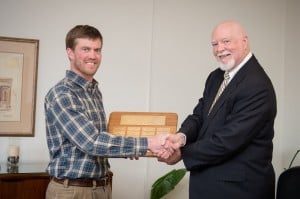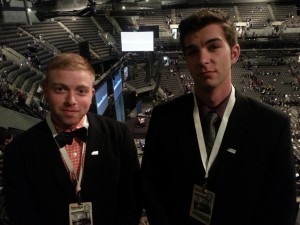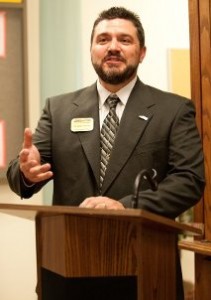This story was oringally posted in Tech Today by Dennis Walikainen, senior editor, for Michigan Technological University’s University Marketing and Communication.

If you enjoyed the project management course, you will really enjoy THE Project 2014 competition. Each year student teams compete by developing a project plan for a specific case study. The competition is sponsored by the West Michigan Chapter of the Project Management Institute (WMPMI). This is the third year of the competition and the number of schools participating as well as teams is expected to increase. There is an opportunity to win a part of the $10,000 prize money too. First place team receives $5,000, second place receives $3,000, and third receives $2,000. In last year’s competition, Michigan Tech’s two teams placed 2nd and 3rd place! We hope to field more winning teams this year.
If you have completed a project management course and are interested in participating, you will need to contact Dr. Dana Johnson dana@mtu.edu before October 1, 2013. You will then be given approval to enroll in OSM4200 Advanced Project Management for Spring 2014. The course meets by arrangement. There is a maximum of three teams with up to six members each so sign up early. More information about the competition can be found here.
If you would like to talk to past team members, there are a few here at Michigan Tech. These students can share with you their experiences of working with PMI certified mentors, opportunities with companies for internships and/or career options, and the great hands on experience. It looks good on your resume too.
This year’s case is based on mergers and acquisitions of health care organizations and was written by Dr. Johnson the faculty advisor. Interested in learning more??? Please contact Dr. Johnson at dana@mtu.edu .
THE Project 2014
The Western Michigan Chapter of the Project Management Institute (WMPMI) is currently in the preparation stages of their 3rd Annual Collegiate Project Management Competition… “THE Project 2014.”
Purpose
To develop young business leaders by partnering college students, community leaders, and Project Management Professionals to competitively tackle a commonly shared business challenge.
Opportunity
Teams will develop a proposal, strategy, approach and plan that could be used to develop a product, service or result. Teams will be judged on their use of proper project management techniques. Team members will enjoy the benefits of working on a real life business challenge with a Project Management Professional Mentor. Teams will compete for a financial reward and recognition.
Fun facts
- Each collegiate team will consist of 4 – 6 students
- Each collegiate team will consist of no more than 50% graduate level students
- Each collegiate team will need to have the names of their team members delivered to the PMI Education Council by no later than November 1st, 2013
- Each collegiate team will have a “Mentor” assigned by the PMI Education Council. A Mentor is a Project Management Professional (PMP) certified in the many disciplines of Project Management and they’ll meet with the team and Team Champion on a regular basis to mentor them through the competition deliverables
- Each collegiate team will have at least 1, no more than 2 “Team Champion(s).” A Team Champion is a school official (usually faculty member or department head) that meets with the team on a semi-regular basis to help motivate and support the work of the team and the Mentor
- Knowledge in or pursuit of a program of study in Business, Engineering or Project Management is not a requirement but will be helpful in completing various competition deliverables as well as having students studying varying backgrounds like Finance, Human Resources, Business, Sociology, etc.
- Each educational institution will be allowed to enter a maximum of 2 teams into the competition
- There is no cost to any students or the educational institution to participate (other than coordinating travel to Grand Rapids on the final event day in April 2014)
- The winning team in the competition receives $5,000 to split between its members however all top 4 finishing teams will receive some form of monetary reward for their success
- The winning team will also have an opportunity to present their project plans at a West Michigan Chapter of PMI dinner meeting
All competitors will participate in a day-long final event where:
- a Reverse Career-Fair will take place involving all the sponsor and partner companies (over half of our competitors in previous years have ended up with an internship or job offer)
- each team will present their final presentations to a panel of leading project management professionals for the first round of judging and the top four teams will then present to a panel of prominent business leaders for final judging
Students will. . .
- Receive an intern like opportunity in Project Management
- Experience a great opportunity to work on real business problems and create a real project plan for the business
- Enjoy a networking opportunity to interact with local business leaders
- Gain real world opportunity to showcase leadership and interpersonal skills
- Represent their school in a collegiate competition
- Develop career focused skills which will translate to career opportunities
- Participate in “hands-on” learning in a team environment
Below are three videos from the PMI website that are great:
Governor Snyder’s Greeting (his personal address to participants in last year’s competition)
West Michigan Week Video – Aired April 2013 (on WGVU News)
THE Project Vision Video (THE Project from an internal perspective)
*The West Michigan Chapter of the Project Management Institute (WMPMI) started planning a collegiate Project Management competition in 2011 for students in various business, engineering and project management content areas. The students competed for a cash prize and in some cases received college credit (this is dependent entirely on the awarding institution… i.e. policies regarding Prior Learning Assessment Credit or ability to implement content material into curriculum). The biggest benefit for the students was the networking they were able to do and the exposure they received to various local businesses and leaders so they might secure internships and jobs once they graduate. This event has grown in size and popularity and is now an annual event that WMPMI looks forward to every year.

Each year the student body within the School of Business and Economics elects one faculty member as Teacher of the Year. Roger Woods has been selected as the 2013 recipient of the coveted award. When asked what this award means, the Lecturer in Operations Management said, “I am honored to be selected given the great faculty that we have in the School of Business and Economics. It has helped that I have had some great mentors and support of other faculty to improve my teaching.”
During his time at Michigan Tech, Woods has proven to be a great asset to the School of Business and Economics. He first won the Teacher of the Year Award in 2011 and that same year was inducted into the Academy of Teaching Excellence as a finalist for the campus-wide teaching award. He was nominated again the following year, was selected as a finalist, and became the recipient of the Distinguished Teaching Award.
Roger Woods has been instrumental in the execution of the Business Development Experience over the past 3 years. His duties included: developing the program structure, finding team projects, and teaching the second semester of the senior capstone experience. Woods notes that “it has been rewarding to see how the students have matured and are able to apply the various School of Business and Economics classes to their projects.”
The task Woods is assigned to is not an easy one. The student teams are all working on different projects which may pull them in different directions. The Business Development Experience is intended to be a practical application of the skills they learn throughout their time at Michigan Tech. We hope that the students can draw on these experiences during an interview for a job, but also that they look back on it as a rewarding hands-on experience.
Now that the Spring 2013 graduates have completed their time at Michigan Tech, Woods is looking forward to seeing a new class of students coming to campus this fall and hearing the success stories of all the recent graduates.

Applied Portfolio Management Program members, Michael Morrison and Austin Kuttruff, gathered with thousands of stakeholders at the Century Center in Omaha, Nebraska over the weekend for the Annual Berkshire Hathaway Shareholder Event. The crowd in attendance was seeking an intimate exposure to Warren Buffet who is widely considered the most successful investor in the 20th century.
Michael said that one of the biggest takeaways from listening to Buffett was “you have to love something to do well at it.” Being Finance majors, the two Michigan Tech School of Business and Economics students jumped at the opportunity to attend the shareholder event and learned about the passion that is required to be successful. The opportunity to meet Warren Buffett, his company, and its subsidiaries is highly coveted in the world of finance. Their itinerary included watching a movie about Buffett’s company, and the opportunity to ask him questions in an open forum.
Given the Warren Buffet is 82 years old, some shareholders had concerns about the future of Berkshire after he eventually steps away. However, Buffett addressed these concerns with confidence in his company and the people who work there, saying:
The priority is that all of us continue to zealously guard Berkshire’s reputation. We can’t be perfect but we can try to be. As I’ve said in these memos for more than 25 years: We can afford to lose money – even a lot of money. But we can’t afford to lose reputation – even a shred of reputation.
Buffet told an Omaha news crew that he’s not going anywhere anytime soon, but there is a solid plan for when he does eventually step down. The people who will continue his legacy know the steps they must take to continue to be successful.
Overall, the trip was a great learning experience for the two students which was financially supported by Joe Dancy and the LSGI Advisors Inc.

On April 22nd, the Applied Portfolio Management Program (APMP) held the sixth Annual “Junior Day”. This special event serves to kick start the incoming juniors, as they take over as the new portfolio managers of the APMP portfolio. The juniors began their morning by attending the Spring APMP Advisory Board and watching the graduating APMP senior student portfolio managers present their year-end performance results. After being introduced to the APMP Advisory Board, the juniors attended a series of guest lectures. This year’s guest speakers included: Ryan Layton, Tim Bailey, Larry Durland, and Paul Kasriel.
Ryan Layton and Tim Bailey are both APMP alumni and introduce the juniors to the program that led them to the careers they have today. Ryan currently works as a portfolio manager with Main Street Investment Advisors in Chicago. Mr. Layton discussed the importance of asset allocation and the process used by Main Street Investment Advisors to determine a portfolio’s optimal asset allocation. Mr. Bailey works at Fortress Investment Group in San Francisco, which is a $44 billion Private Equity/Hedge fund. He discussed alternative asset investing strategies employed in the hedge fund industry with the new APMP students.
APMP Advisory Board Chairman Larry Durland, discussed the thoughtful development of an investment philosophy and strategy, during his time with the APMP teams. In addition to talking to the APMP teams, Mr. Kasriel also opened his presentation to the entire School of Business and Economics. Over 60 students attended his guest lecture on the current macroeconomic decisions facing the Federal Reserve and investors. A resident of Door County, Wisconsin, Mr. Kasriel serves as the President of Econtrarian, LLC and is a senior economics and investment advisor with Legacy Private Trust Company of Neenah, Wisconsin.
Junior Day give the students exposure and experience talking with professionals working in the world of finance. As APMP team members, they will be responsible to the APMP Advisory Board as they manage over $1 million during their senior year at Michigan Tech.
Financial support for Junior Day was provided by James and Dolores Trethewey.
